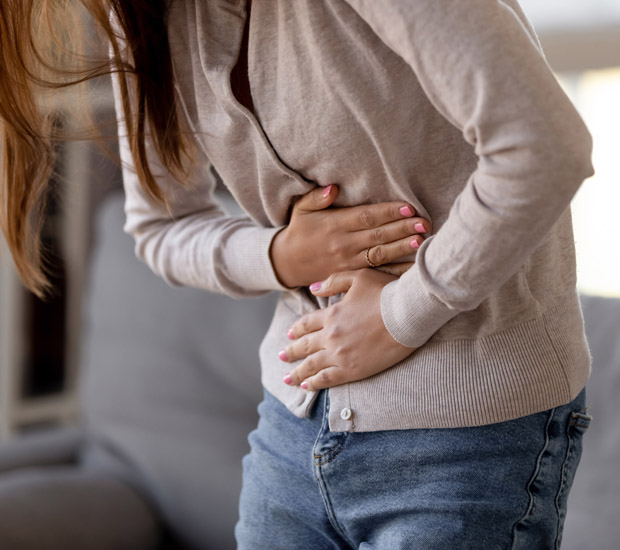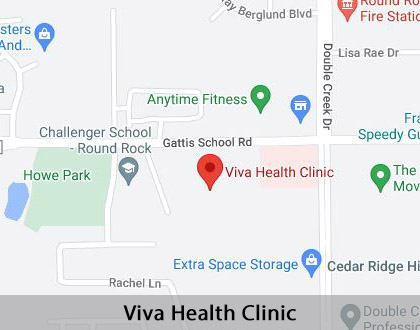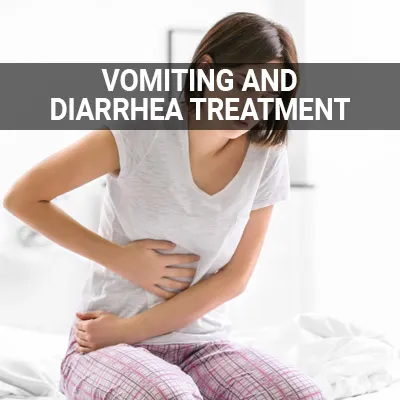Food Poisoning Treatment Round Rock, TX
A food-borne illness, commonly known as food poisoning, is typically caused by infectious organisms that enter the body through contaminated food. Symptoms, such as nausea, vomiting, and diarrhea, appear within hours of eating contaminated food. Whether the food-borne illness is of a toxic nature, infectious, or caused by ingestion of contaminated water or food, it is crucial to remove the disease-causing pathogens from the body.
Food poisoning treatment is available at Viva Health Clinic in Round Rock and the surrounding area. Our primary care practitioner can help determine whether the symptoms you feel are related to food poisoning, the type of contamination, and treatments to relieve your symptoms. Call us at (512) 243-5872 for more information or to make an appointment.
Food Poisoning Treatment
Infectious organisms, including parasites, bacteria, viruses, and many other toxins found in foods and drinks, can cause food poisoning. These toxic elements can contaminate food during production or processing and can occur in homemade food that is handled un-hygienically or is undercooked. While most mild cases of food poisoning are treatable at home, it is beneficial to know the causes and symptoms.
Primary care practitioners are highly experienced in diagnosing food poisoning symptoms. They provide immediate treatment to prevent harmful substances from spreading in the body. Food poisoning symptoms can be mild, but can include severe dehydration, dry mouth, severe weakness, or abdominal cramping when left untreated.
“Infectious organisms, including parasites, bacteria, viruses, and many other toxins found in foods and drinks, can cause food poisoning.”
Causes of Food Poisoning
Food poisoning has three primary causes: parasites, bacteria, and viruses.
Parasites
Parasites are one of the leading causes of food poisoning. Although they cause the same symptoms as bacteria, they spread more rapidly than bacteria and are much more dangerous. Toxoplasma is one of the common parasites that cause food poisoning. The parasite is mostly found in undercooked meat and cat feces.
The parasite can be more dangerous for pregnant women and cause congenital disabilities in a fetus if the mother is infected. Typically, these parasites live in the digestive tract and can remain undetected for a long time. If a patient's immune system is weak and they experience food poisoning symptoms frequently, Toxoplasma may be a cause.
Bacteria
Bacteria are included in the most prevalent causes of food-borne diseases. Common bacteria that cause food poisoning include Salmonella, Bacillus cereus, Listeria, and E. Coli. Bacillus cereus, an essential bacteria in the industrialized world that produces different enterotoxins. The bacterium is generally found in heat and electrically cooked food.
Most bacteria are competitive microorganisms and grow well at -48 °C after cooling and cooking. The CDC reports approximately 20,000 hospitalizations due to food poisoning annually. Besides the listed common bacteria, C. botulinum and Campylobacter are two potentially dangerous bacteria that easily find their way into undercooked and raw food.
Viruses
Viruses are another common cause of food poisoning. Norwalk virus, also known as Norovirus, is an infectious virus that causes severe vomiting and diarrhea. It infects more than 19 million people every year and spreads easily, especially through shared food and water. Rotavirus, Sapovirus, and Astrovirus are other viruses that cause similar symptoms but are comparatively less common.
Hepatitis A virus is acquired through contaminated food and can cause severe symptoms. Hepatitis B and C result from untreated, minor viruses or stronger acting viral agents in contaminated foods and drinks, and require immediate medical attention. It is difficult to self-assess whether an illness is a virus and which type; therefore, it is crucial to receive an examination from a primary care practitioner.
“According to health professionals, food poisoning has three primary causes: parasites, bacteria, and viruses.”
Symptoms of Food Poisoning
Food poisoning symptoms do not normally go undetected. Symptoms vary depending on the severity of the infection. They may start to appear soon after a meal, hours later, or even days after the event depending on the cause of the infection (bacterial, viral, or parasite). The normal range of time for symptoms to appear is a minimum of one hour and a maximum of 28 days.
It is important to visit a primary care practitioner if a patient experiences vomiting, abdominal cramps, weakness and nausea, mild fever, diarrhea, headache, and appetite loss. Our primary care practitioners can help treat food poisoning before its symptoms become potentially life-threatening. Fatal symptoms that require immediate emergency attention include high temperature up to 101.5 °F, persistent diarrhea, severe dehydration, blood in urine, and excessive urination.
“The normal range of time for symptoms to appear is a minimum of one hour and a maximum of 28 days.”
Check out what others are saying about our primary care practitioner services on Yelp: Food Poisoning Treatment in Round Rock, TX
Risks of Food Poisoning
Food poisoning is such a common phenomenon that nearly everyone is at high risk of acquiring a form of this infection at least once in their life. However, certain people are more at risk of getting infected by a food-borne illness. For example, people with an auto-immune disease or suppressed deference mechanism are at a higher risk of suffering from the complications of food poisoning.
Elderly individuals and children are also at a higher risk of contracting food poisoning as their immune systems tend to be weaker. Expecting mothers are at an increased risk of infections and hold a high risk of their babies contracting the same illness. A primary care practitioner helps patients deal with the infection and guides them on metabolic changes that occur in the body during pregnancy.
“Food poisoning is such a common phenomenon, nearly everyone is at high risk of acquiring a form of this infection at least once in their life.”
Questions Answered on This Page
Q. What is food poisoning treatment?
Q. What are the most common causes of food poisoning?
Q. What are food poisoning symptoms?
Q. Who is at high risk of contracting food poisoning?
Q. What type of treatment is provided by a primary care practitioner?
People Also Ask
Q. When should I seek professional treatment for vomiting or diarrhea?
Q. What treatment options are available for general illnesses?
Q. When should patients see their primary care practitioner?
Treatment for Food Poisoning
Our primary care practitioners can diagnose the cause of a foodborne illness and ensure the prevention of dehydration. Many foodborne illnesses that cause severe diarrhea could lead to the loss of essential minerals and fluid from the body. Depending on your condition, medication may be prescribed for treatment, or over-the-counter products (such as Pepto-Bismol or Imodium) can help suppress nausea and control diarrhea.
In severe cases, the patient may be given hydration drips with IV (intravenous fluids) as immediate treatment. In these cases, our practitioners prefer more extended hospitalization treatment to monitor the condition 24/7 until a full recovery is made. A patient may be transferred from our office to an emergency room or gut specialist if symptoms do not improve.
“Our practitioners can diagnose the cause of a foodborne illness and ensure the prevention of dehydration.”
Frequently Asked Questions
Q. What foods can cause poisoning?
A. Foods that are left out of the fridge for a long time are the primary cause of food poisoning. Other sources are raw shellfish, undercooked meat, raw meat, and unwashed fruits and vegetables. Another common cause is consuming expired foods and drinks.
Q. How is food poisoning diagnosed?
A. In many cases, food poisoning symptoms like dehydration, vomiting, or nausea alert a person of having an illness. In severe cases, a practitioner may take a blood test to determine the cause of an infection and diagnose food poisoning. A patient's stool sample can also help determine a food-borne illness and its cause.
Q. How can I avoid or prevent food poisoning?
A. The best way to avoid food poisoning is to eat fresh, homemade food. It is crucial to always wash fruits and vegetables before eating them. It is a good idea to avoid buying packaged food, but if necessary, check their expiration date before consuming it. Lastly, we encourage avoiding refrigerated leftovers.
Q. How can I treat food poisoning at home?
A. Since dehydration is a common symptom of food poisoning, it is important to drink plenty of water and fluids. Many over-the-counter medications, such as Pepto-Bismol, aid in relieving minor symptoms. Determining the root cause of infection and eliminating any other risks in the house are helpful in removing the illness and cleansing the stomach.
Q. How does food become contaminated?
A. Some foods are already contaminated, such as chicken with infected reproductive organs that lay contaminated eggs or fish feeding from a contaminated water source. Foods are often mishandled or poorly washed, at restaurants and at home. Finally, proper processing techniques are not always adhered to and lead to organisms being processed with the food through the machines.
Start Feeling Better – Visit Us Today
By visiting us as soon as possible, our team can help get you the professional treatment you need. Instead of waiting around and allowing the symptoms to get worse, we can provide you with treatment options.
Definition of Medical Terminology
Call Us Today
Overall, there is no doubt that food poisoning can be life-threatening if treatment is delayed. However, with immediate treatment, almost all forms of food poisoning are curable. Call us at 512-243-5872 for more information or to make an appointment.
Helpful Related Links
- American Association of Poison Control Centers. American Association of Poison Control Centers. 2023
- American Journal of Medicine. American Journal of Medicine. 2023
- American Medical Association (AMA). American Medical Association (AMA). 2023
- Food and Drug Administration. Food and Drug Administration. 2023
- Food Safety Inspection Service. Food Safety Inspection Service. 2023
- Health Resources & Services Administration. Health Resources & Services Administration. 2023
About our business and website security
- Viva Health Clinic was established in 2023.
- We accept the following payment methods: American Express, Cash, Discover, MasterCard, and Visa
- We serve patients from the following counties: Williamson, Travis, McLennan
- We serve patients from the following cities: Pflugerville, Austin, Kyle, Waco, Leander, Cedar Park, Bastrop, Round Rock, Georgetown, Hutto, Liberty Hill, and Taylor
- National Provider Identifier Database (1104428416). View NPI Registry Information
- Norton Safe Web. View Details
- Trend Micro Site Safety Center. View Details
Back to top of Food Poisoning Treatment










